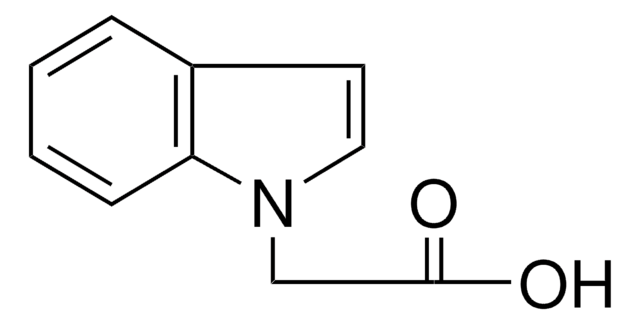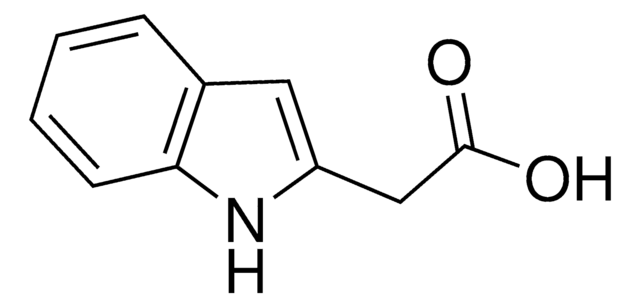I2886
Acide 3-indoleacétique
suitable for plant cell culture, crystalline
Synonyme(s) :
indole acetic acid, Heteroauxin, IAA
About This Item
Produits recommandés
Pureté
≥98%
Niveau de qualité
Forme
crystalline
Technique(s)
cell culture | plant: suitable
Couleur
white to pink
Pf
165-169 °C (lit.)
Application(s)
agriculture
Température de stockage
−20°C
Chaîne SMILES
OC(=O)Cc1c[nH]c2ccccc12
InChI
1S/C10H9NO2/c12-10(13)5-7-6-11-9-4-2-1-3-8(7)9/h1-4,6,11H,5H2,(H,12,13)
Clé InChI
SEOVTRFCIGRIMH-UHFFFAOYSA-N
Vous recherchez des produits similaires ? Visite Guide de comparaison des produits
Application
- as standard to quantify hormones
- to modify MS (Murashige and Skoog) media for the initiation of callus
- as an external standard in the analyses of free endogenous growth regulators
Notes préparatoires
Code de la classe de stockage
11 - Combustible Solids
Classe de danger pour l'eau (WGK)
WGK 3
Point d'éclair (°F)
Not applicable
Point d'éclair (°C)
Not applicable
Équipement de protection individuelle
Eyeshields, Gloves, type N95 (US)
Certificats d'analyse (COA)
Recherchez un Certificats d'analyse (COA) en saisissant le numéro de lot du produit. Les numéros de lot figurent sur l'étiquette du produit après les mots "Lot" ou "Batch".
Déjà en possession de ce produit ?
Retrouvez la documentation relative aux produits que vous avez récemment achetés dans la Bibliothèque de documents.
Les clients ont également consulté
Protocoles
Reference guide and preparation guide for antibiotic and antimycotic use in plant tissue culture.
Reference guide and preparation guide for antibiotic and antimycotic use in plant tissue culture.
Reference guide and preparation guide for antibiotic and antimycotic use in plant tissue culture.
Reference guide and preparation guide for antibiotic and antimycotic use in plant tissue culture.
Notre équipe de scientifiques dispose d'une expérience dans tous les secteurs de la recherche, notamment en sciences de la vie, science des matériaux, synthèse chimique, chromatographie, analyse et dans de nombreux autres domaines..
Contacter notre Service technique









